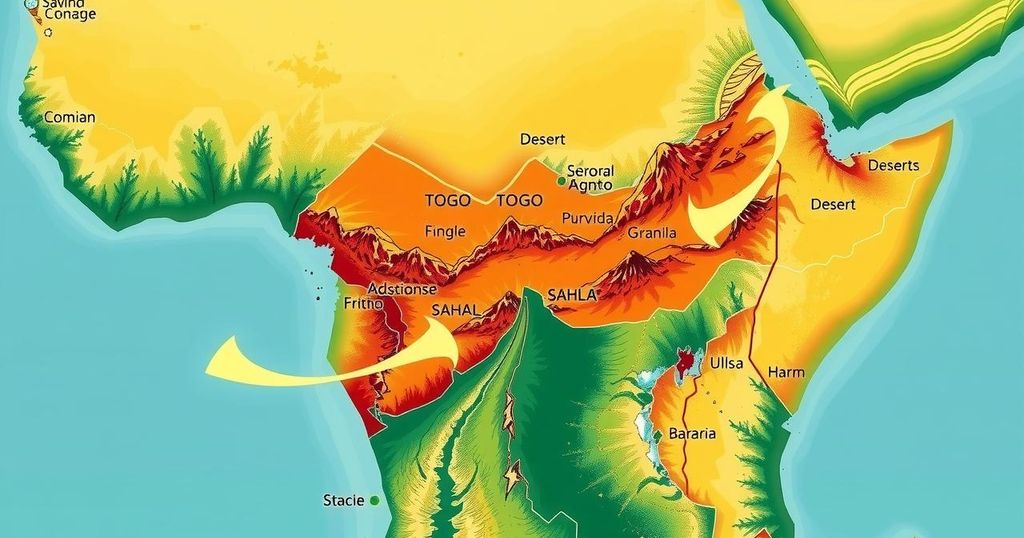Togo is exploring membership in the Alliance of Sahel States, potentially weakening ECOWAS. This move reflects strategic interests in regional cooperation, security enhancements, and economic opportunities amid rising tensions in West Africa. Analysts note the implications for Togo’s governance and regional dynamics, as its alignment with the AES might challenge ECOWAS’s unity.
Togo is signaling a potential shift in West African geopolitics by exploring membership in the Alliance of Sahel States (AES), comprised of military-led Mali, Burkina Faso, and Niger. This development could further weaken the Economic Community of West African States (ECOWAS), especially following the withdrawal of the three Sahelian nations. Togo’s Foreign Minister, Robert Dussey, has expressed interest in this alliance, stating that its membership is “not impossible.”
Togo’s consideration of joining the AES reflects a strategic decision that aims to strengthen regional cooperation and facilitate port access for member countries. For landlocked nations like Mali, Burkina Faso, and Niger, Togo’s coastal access through the port of Lomé could significantly enhance trade. Furthermore, in the context of rising tensions with ECOWAS members such as Ivory Coast and Benin, trade between these Sahel states and Togo’s ports is already increasing.
Political analysts have noted that a formal alliance could unlock economic and security advantages. Madi Djabakate, a Togolese political analyst, mentioned the potential economic solidarity involving Nigerien oil and expanded trade routes. He also referenced the security benefits that might arise from Togo’s involvement in “more agile military cooperation and intelligence sharing” with AES members, especially given the threat of jihadist insurgencies.
The AES started as a defense coalition and aims to create a joint military force, which aligns with Togo’s increasing focus on security due to rising jihadist threats, particularly in regions near Burkina Faso. Beyond security concerns, Togo’s engagement with the AES resonates with a broader pan-Africanist ideology. Djabakate emphasizes this point by suggesting that Togo’s actions contribute to a collective movement towards unity in Africa.
Nonetheless, domestic political considerations play a role in Togo’s potential pivot. President Faure Gnassingbé has faced criticism for constitutional changes perceived as extending his rule, and aligning with the AES could offer some insulation against regional pressures concerning governance and human rights. Opposition figure Nathaniel Olympio cautioned against the transition, warning that AES membership would shield Togo’s regime from ECOWAS’s demands regarding the rule of law.
ECOWAS is struggling with internal cohesion following the exits of Mali, Niger, and Burkina Faso, who have criticized the organization for prioritizing Western interests over regional security. Despite Togo’s possible shift towards the AES, it may maintain a degree of affiliation with ECOWAS, acknowledging that alliances are partnerships rather than absolutes. However, experts like Seidik Abba warn that Togo’s accession to the AES could expedite ECOWAS’s decline, exacerbating the region’s existing challenges.
As West Africa navigates a complex political landscape, Togo’s decisions in the near future may significantly impact the region’s direction, either reinforcing the fragile unity of ECOWAS or further empowering the emergent Sahel bloc.
In summary, Togo’s exploration of joining the Alliance of Sahel States marks a significant potential realignment in West African geopolitics. This shift poses challenges for the Economic Community of West African States, particularly amidst the backdrop of rising jihadist threats and internal political dynamics. As Togo considers this strategic move, the implications for regional cooperation, economic benefits, and governance remain pivotal factors in determining West Africa’s future trajectory.
Original Source: www.pulse.ng




